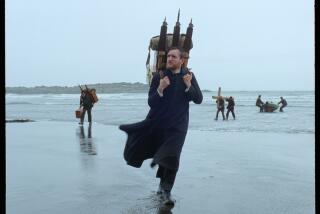The power of sibling devotion
- Share via
To Siberia
A Novel
Per Petterson
Translated from the Norwegian
by Anne Born
Graywolf: 246 pp., $22
--
Imagine frozen fields and moonlight and two children running. The sea is so close the little girl worries it will fill her room while she sleeps. At 14, her older brother is already a committed socialist. Growing up in a village in far northern Denmark, the girl dreams of taking the Trans-Siberian railroad to Siberia one day. Her older brother, Jesper, dreams of Morocco.
Per Petterson’s new novel, “To Siberia,” is a brilliant re-creation of “Hansel and Gretel.” The brother and sister are left to their own devices by a cold, scarred father and a holier-than-thou mother. Their grandfather hangs himself in the cowshed, leaving a note that reads: “I cannot go on any longer.” War looms; children are frustrated and frightened by their parents’ refusal to stand up to the Nazis who have invaded their streets and lives. Jesper cannot resist the desire to fight them. His sister worries but is also proud when her brother helps sink a German ship in the Skagen harbor. And then he must go away to Sweden. It is a Scandinavian novel.
Nothing compares to the childhood closeness between this brother and sister. They save each other repeatedly in a million small ways -- from the adults around them and from grim nature: gray shapes on the margins of the forest, howling winds and unpredictable seas. Jesper calls his sibling “sistermine”; theirs is a love so dense it is almost erotic. But not quite.
When they reach a certain age, the sister mourns the passage of their intimate connection: “I fill my head with thoughts till it feels lilac and hot like the glowing iron at the blacksmith’s forge while I stand bent over my naked brother weeping because he is beautiful as pictures I have seen in books of men from other times, grown men. . . . He is not the same any more, cannot be and his arm around my shoulder will never be the same again.”
Petterson, who won the 2007 International IMPAC Dublin Literary Award for his novel “Out Stealing Horses,” weaves a cocoon around his characters, a cocoon of light and memories and fears and dreams. He uses strange words from another world (helmsman, seawrack, dryshod), writes about the way a bird might make a nest and puts the brother and sister in that nest. From the very first page, he shares a secret with the reader, but not with his characters: They are never safe, not for a moment.
“To Siberia” is a darkly beautiful story, an evocation of the grim equanimity of the Danish people, the fierce and constant weather and the childish idea that we could possibly save each other from the world.
--
More to Read
Sign up for our Book Club newsletter
Get the latest news, events and more from the Los Angeles Times Book Club, and help us get L.A. reading and talking.
You may occasionally receive promotional content from the Los Angeles Times.







